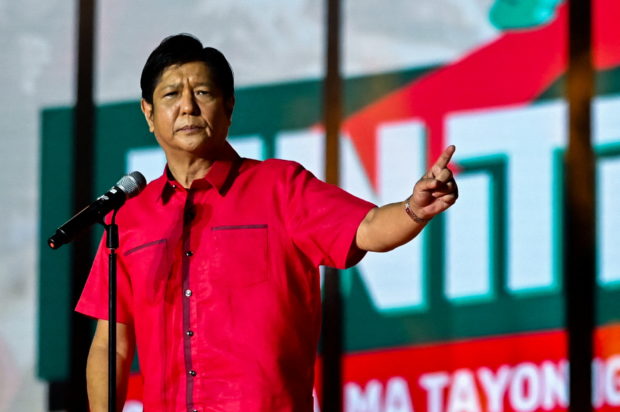Marcos Jr.’s wide lead can be overcome, analysts say

Presidential candidate Ferdinand Marcos Jr., son of late dictator Ferdinand Marcos, gestures as he delivers his speech during the first day of the campaign period for the 2022 presidential election, at the Philippine Arena, in Bulacan province, Philippines, Feb. 8, 2022. (REUTERS/Lisa Marie David)
MANILA, Philippines — The wide lead of Ferdinand “Bongbong” Marcos Jr. in the latest Pulse Asia survey could be attributed to the consolidation of his support base with that of his running mate, his early preparation for the campaign, and the initial failure of his rivals to challenge him, analysts said.
But they also said this lead was not insurmountable and the numbers could still change.
The survey, conducted on Jan. 19 to 24 poll and released on Sunday, showed the son and namesake of the late dictator still leading the presidential race with 60 percent, followed by Vice President Leni Robredo with 16 percent.
Marcos Jr.’s running mate, Davao City Mayor Sara Duterte, leads the vice-presidential race at this point with 50 percent, followed by Senate President Tito Sotto with 29 percent.
Political scientist and University of the Philippines professor Jean Encinas Franco acknowledged that Marcos Jr. had “a strong lead, but I think it’s not impossible for other candidates to be able to overcome that.”
Article continues after this advertisementNarrative
Analyst Victor Manhit, founder and managing director of think tank Stratbase Group, said Marcos Jr. and Duterte both had a solid base, which served to strengthen their candidacies when they joined forces.
Article continues after this advertisementManhit also noted that the other candidates did not challenge soon enough the narrative that the Marcos camp had already impressed on voters early on.
The Marcos camp had been promoting the narrative that the dictator’s rule was a progressive era for the country, in contrast to its actual documentation as a time of repression, poverty, corruption, and economic mismanagement.
“For two and a half months, they were trying to offer themselves as better than Marcos. But nobody was attacking Marcos,” Manhit said.
This ensured that Marcos Jr. was “doing a very good story about his candidacy, and with the solid supporters of Duterte and the Marcoses consolidating, he became formidable,” he added.
In contrast, Robredo had to endure attacks by trolls, social media personalities, and vloggers, he said.
But Manhit does not share the view that Marcos Jr. will become more popular if attacked.
“[With] nobody raising issues against Marcos, you allow him to tell his story, [as] the different campaigns did,” he said.
He observed that the other candidates had since stepped up their criticism of Marcos Jr., especially when he refused to join the Jan. 22 presidential interviews which aired on GMA Network.
That event was one of several “developments” that Pulse Asia noted as a background to its latest survey.
Marcos Jr. had declined the Feb. 4 presidential forum hosted by the Kapisanan ng mga Brodkaster ng Pilipinas and another forum to be hosted by CNN Philippines. Manhit said this could change the next survey numbers.
‘Bust the myth’
Franco said Marcos Jr. had benefited from his early preparations and campaigning.
“If it is to be believed that he started three years ago, then it means that he has a lot of resources and he had a longer ‘campaign period,’” she said.
She pointed out how Marcos Jr. had saturated social media, including TikTok, with posts about the “glory days” of his father’s regime.
It is this “revised past” or “myth-making” that has helped the Marcos campaign, Franco said.
“This is also why he’s not attending debates because it will bust the myth,” she added.
Whether he could bank on this strategy until the end of the campaign remains to be seen, she said, adding that Marcos Jr. might change tact if his numbers become affected.
Surveys are just a snapshot of a particular time, and people are “forever reflexive,” Franco said.
RELATED STORIES
Marcos Jr. and Duterte still leading in Pulse Asia poll